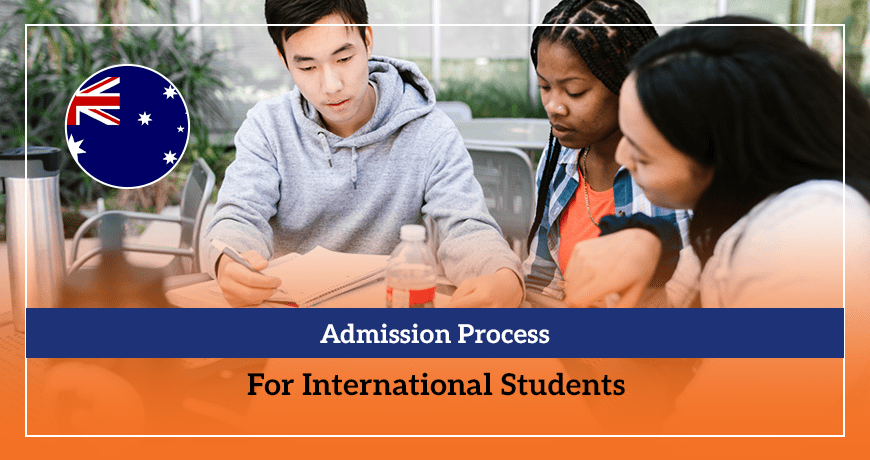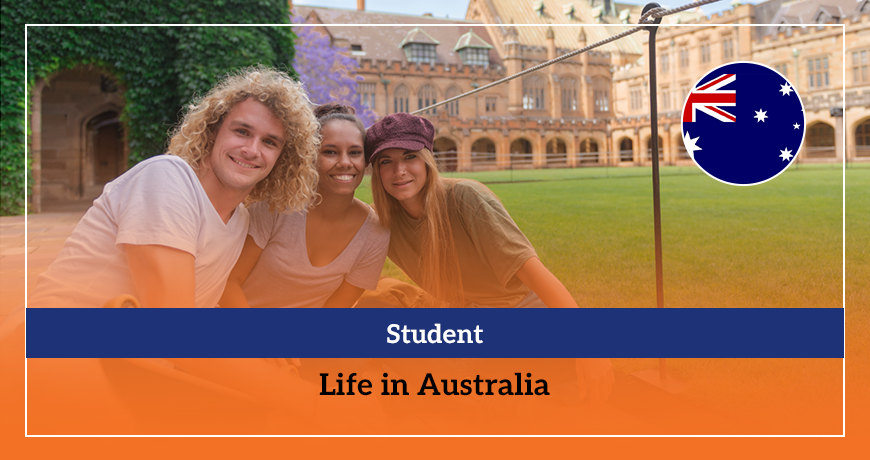For international students contemplating their higher education options, Australia offers a compelling choice. The initiative to study in Australia for international students has seen significant growth, with about 645,516 students enrolled in 2023, a number that not only bounced back to pre-pandemic levels but also set a new high. This upward trend is anticipated to continue into 2024, highlighting Australia's sustained appeal as a prime educational destination.
This sustained interest in studying in Australia for international students is not surprising given the country's reputation for high academic standards, diverse course offerings, and vibrant campus life. Australian universities are known for their innovative research and strong global connections, making them ideal for students looking to enhance their educational experience while gaining international exposure. With comprehensive support systems in place, Australia remains dedicated to providing an inclusive and enriching environment for students from all corners of the globe.
Why Study in Australia?
Choosing to study in Australia can significantly enhance your educational and personal development. Renowned for its high academic standards and vibrant cultural life, Australia provides a unique learning environment that blends rigorous education with a high quality of life. Below are key points that make Australia a top destination for international students:
- World-Ranked Universities: Many of Australia’s universities are consistently ranked among the top 100 globally, known for their robust academic programs and groundbreaking research initiatives.
- Scholarship Opportunities: Comprehensive scholarship programs offered by both the government and educational institutions cover significant parts of tuition and living expenses, easing the financial burden for international students.
- Work While You Study: International students in Australia can work up to 20 hours per week during the semester, helping them manage their expenses and gain valuable work experience.
- Cultural Diversity: Australia’s multicultural environment offers a welcoming atmosphere for students from all over the world, enhancing their educational experience with rich cultural exchanges.
- Quality of Life: Australia is known for its friendly community, beautiful landscapes, and high safety standards, all of which contribute to a supportive learning and living environment.
- Innovative Research Opportunities: Students have access to state-of-the-art research facilities and can engage in high-level research with some of the best minds in their fields.
- Post-Study Work Rights: After graduation, international students can avail themselves of post-study work visas, allowing them to stay and work in Australia, thereby gaining international work experience.

Admission Process For International Students
Many students often ask about the requirements for international students to study in Australia. Here are the important points to consider while applying to any Australian university.
Preparing for Study in Australia
Australia has 43 universities, both public and private. When researching universities and programs, consider factors such as university rankings, graduate outcomes, available courses, the total cost, admission requirements, location, and scholarship opportunities.
Admission Requirements:
- Academic Transcripts: Submit official transcripts of previous education.
- Recognition of Foreign Qualifications: Ensure your qualifications are recognised in Australia.
- English Language Proficiency: Pass an approved English language test such as IELTS, TOEFL, or PTE with a minimum score required by the university.
Applying to Australian Universities
Applying to Australian universities involves several steps:
- Research and Shortlist Universities: Based on your interests and career goals, research and select universities.
- Application Timeline: Apply at least 2-3 months before the semester start date to ensure ample time for processing.
- Documentation: Prepare and submit all required documents, including:
- Application Form: Complete the university’s application form.
- Academic Transcripts: Provide your educational records.
- English Proficiency Scores: Submit IELTS, TOEFL, or PTE scores.
- Letters of Recommendation: Obtain recommendations from academic or professional referees.
- Statement of Purpose: Write a clear and effective statement detailing your achievements, goals, and reasons for choosing Australia (no more than 300 words).
- Financial Proof: Show evidence of sufficient funds to cover tuition and living expenses.
Visa and Immigration Procedures
To study in Australia, you need a student visa (subclass 500). The visa application involves:
- Confirmation of Enrolment (CoE): Obtain a CoE from the university.
- Genuine Temporary Entrant (GTE) Statement: Demonstrate that you intend to stay in Australia temporarily for study purposes.
- Financial Evidence: Prove you have enough funds to support yourself.
- Health Insurance: Purchase Overseas Student Health Cover (OSHC) for the duration of your stay.
- English Proficiency: Meet the English language requirements.
- Visa Application: Apply through the Department of Home Affairs online system, submit all necessary documents, and pay the visa fee.

Financing Your Study In Australia
Studying in Australia can be a rewarding experience, but it's important to plan your finances carefully. Here’s a comprehensive guide to help you understand the financial aspects of studying in Australia.
Tuition Fees and Scholarships
The tuition fees for international students in Australia vary depending on the university and the course of study. On average, you can expect to pay between AUD 20,000 and AUD 50,000 per year.
Scholarships: There are numerous scholarships available to help offset these costs:
- Australia Awards: These prestigious scholarships cover full tuition fees, return air travel, establishment allowance, and other benefits.
- University Scholarships: Many Australian universities offer scholarships specifically for international students. These can range from partial tuition fee waivers to full scholarships covering all costs.
- Private and Government Scholarships: Various private organisations and government bodies also offer scholarships to international students. Examples include the Fulbright Commission and the Soros Foundation.
Cost of Living
The cost of living in Australia can vary significantly based on the location and lifestyle. On average, international students should budget between AUD 1,400 to AUD 2,500 per month to cover living expenses. Here’s a breakdown of typical monthly costs:
- Accommodation: AUD 450 to AUD 1,700, depending on the type and location (e.g., homestay, halls of residence, or rented apartment).
- Utilities, Food, and Transportation: These can add up to a significant portion of your budget, so plan accordingly.
- Health Insurance: Health insurance is mandatory for international students in Australia. The average cost is about AUD 500 to AUD 600 per year.
Part-Time Work and Internships
One of the benefits of studying in Australia is the opportunity to work part-time. International students can work up to 48 hours per fortnight during the semester and full-time during breaks. Common part-time jobs include:
- Hospitality roles such as barista, bartender, or server.
- Retail positions and tutoring.
- Internships in your field can provide income and valuable work experience.
Earnings: The minimum wage in Australia is relatively high, with students earning up to AUD 40 per hour depending on the job and their experience.
Budgeting Tips
- Plan Ahead: Start budgeting before you arrive in Australia. Consider all potential costs, including tuition, living expenses, travel, and insurance.
- Explore Financial Aid: Use scholarships, grants, and bursaries available from various sources.
- Work-Study Balance: Working part-time can help with expenses, so ensure it doesn’t interfere with your studies. Prioritize your academic goals to make the most of your study abroad experience.

Student Life in Australia
Various aspects of student life should be considered when considering the best place for international students to study in Australia. Here is a detailed guide to help you navigate the essentials:
Campus Facilities and Resources
Australian universities are renowned for their excellent campus facilities and resources, including:
- Libraries: Comprehensive libraries with vast collections of books, journals, and access to online databases.
- Laboratories and Research Facilities: Cutting-edge labs where students can conduct hands-on experiments and research.
- Student Organisations and Clubs: Universities host many student organisations and clubs that cater to diverse interests, from academic and professional groups to cultural and recreational clubs. These clubs are crucial in helping students form connections and engage in campus life.
- Sports and Recreational Activities: Universities offer various sports facilities and recreational activities to promote physical fitness and a healthy community.
Accommodation and Housing
International students in Australia have several accommodation options:
-
University-Provided Accommodation:
- Residential Colleges: Often include meal plans and utilities, providing a convenient all-in-one living solution.
- Apartment Buildings or Shared Houses: Managed by the university, these offer a balance between independence and support.
-
Purpose-Built Student Accommodation:
- Fully furnished rooms with shared or private facilities, often located near campuses.
- Access to amenities like gyms, game rooms, and social spaces.
-
Homestays:
- Live with local families, offering a unique cultural immersion experience. Managed by networks like the Australian Homestay Network.
-
Private Rentals:
- Independent living options like apartments or houses are typically shared with other students. It's essential to consider the housing market conditions and availability.
Health and Safety
Health and safety are paramount for international students in Australia:
- Overseas Student Health Cover (OSHC): Mandatory health insurance that covers medical and hospital expenses, ambulance services, and limited pharmaceuticals.
- Emergency Contacts: Students can dial '000' for immediate assistance or '131 444' for non-life-threatening situations. It's crucial to be familiar with these numbers and other safety protocols provided by the university.
Public Transportation
Australia boasts an extensive public transportation network that includes buses, trains, trams, and ferries. Most major cities have ticketing systems, such as MyWay in Canberra, Opal in Sydney, myki in Melbourne, and GoCard in Brisbane. International students can often apply for concession cards to benefit from discounted fares.
Food and Lifestyle
Australia's multicultural environment is reflected in its diverse food scene. From local Australian cuisine to a wide variety of international foods, students can explore different culinary delights. Additionally, the country's vibrant cultural and natural attractions offer ample opportunities for adventure and relaxation outside the classroom.
Tips for a Smooth Transition
- Making Friends: Join student groups and participate in university activities to build a social network.
- Understanding the Learning Style: Embrace the independent and innovative learning approach typical in Australian education.
- Cultural Adaptation: To fully appreciate your study abroad experience, engage with the local community, attend cultural events, and explore Australia's natural beauty.

Working Opportunities And Career Support
Australia offers many opportunities for international students to work and develop their careers, supported by various visas and services. Here's a comprehensive guide to help you navigate these options.
Post-Study Work Opportunities
Temporary Graduate Visa (Subclass 485):
- Duration: This visa allows you to live, work, and study in Australia temporarily for 2 to 4 years, depending on your qualification. Bachelor's graduates can stay for 4 years, Master's for 5 years, and Doctoral graduates for 6 years.
- Benefits: It provides a pathway to gain valuable work experience in Australia, which can be essential for career growth and possibly obtaining permanent residency.
Permanent Residency:
- Skilled Independent Visa (Subclass 189): This visa lets you live and work in Australia as a permanent resident. Key criteria include relevant work experience, proficiency in English, and meeting the points-based system requirements.
Career Support and Development
University Career Centres:
Australian universities offer extensive career support services, including:
- Resume Writing and Interview Preparation: Tailored workshops and one-on-one sessions to help polish your resume and hone your interview skills.
- Job Search Strategies: Guidance on effectively searching for jobs, including using online portals and networking strategies.
Networking and Job Fairs:
- Events and Workshops: Universities regularly host networking events and job fairs where you can connect with potential employers and industry professionals.
- Volunteer and Work Experience: Volunteering is encouraged as it does not count towards your work-hour limit and provides invaluable experience.
Part-time Work While Studying:
- Work Hours: International students can work up to 48 hours per fortnight during the academic session and unlimited hours during holidays.
- Types of Jobs: Popular part-time roles include positions in retail, hospitality, administration, and tutoring. Both on-campus (e.g., library assistant) and off-campus opportunities (e.g., customer service roles) are available.
Top Cities for Study and Work:
- Melbourne: Known for its vibrant student life and opportunities in various fields such as IT, hospitality, and administration.
- Sydney: Offers diverse job opportunities in sectors like education, healthcare, and retail.
- Perth: A growing city with a strong focus on research and development, providing roles in academia and professional services.
Work Rights and Protections:
- Equal Rights: International students have the same workplace rights and protections as any other employee in Australia. This includes receiving at least the minimum wage and working under fair conditions.
- Tax File Number (TFN): You will need a TFN to work in Australia, which you can apply for through the Australian Taxation Office (ATO) upon arrival.
Cultural and Travel Experiences
Have you ever wondered why international students choose to study in Australia? Beyond its premier educational offerings, Australia offers an opportunity to explore the region's rich natural and cultural treasures.
Exploring Australia’s Natural Wonders
Australia boasts 29 of the world's most recognisable landmarks, a mix of natural and artificial wonders. Here are some of the most popular natural landmarks in Australia:
In these stunning locations, you can partake in various outdoor activities such as:
- Camping
- Surfing
- Quad biking
- Swimming with whale sharks and fur seals
- Scuba diving
- Snorkelling
For city exploration, international students can visit:
- Sydney
- Melbourne
- Brisbane
- Gold Coast
- Great Ocean Road
Ensure you choose affordable budget options to maximise your travel experience.
Australian Culture and Festivals
Australia is renowned for its incredible diversity. The Aboriginal and Torres Strait Islander peoples represent the oldest living civilisation. In Australia, you can explore numerous historic Indigenous sites such as:
- Kakadu National Park
- Wet Tropics of Queensland
- Willandra Lakes Region
Additionally, Australia hosts various vibrant festivals and events throughout the year, including:
- Sydney Mardi Gras
- Melbourne Cup
- Vivid Sydney Festival
Conclusion
Australia is a prime destination for international students due to its exceptional educational standards and diverse cultural atmosphere. The universities in Australia are highly regarded globally, offering a wide range of programs and courses that cater to various academic interests and career aspirations. Students who study in Australia can immerse themselves in a multicultural learning environment that not only enhances their academic knowledge but also broadens their cultural understanding and interpersonal skills.
The opportunity to study in Australia for international students is enriched by the possibility of post-study work options, which provide valuable work experience and further career opportunities internationally. Moreover, the country's safe environment and high quality of life make it an ideal place for students to live and study. The affordable tuition fees compared to other English-speaking destinations and numerous scholarships and part-time work opportunities make studying in Australia an attractive and practical choice for students worldwide.